Beyond the basics
Is the quality of crew training keeping pace in an ever-evolving technological landscape?
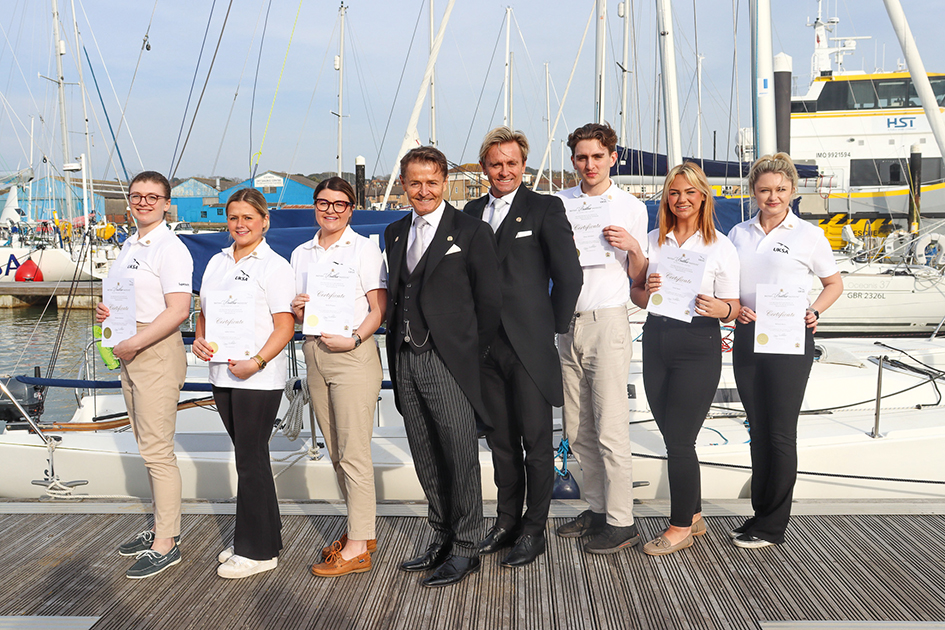
Butler training graduation (Image courtesy of UKSA).
Without crew, a superyacht is just an empty feat of impressive design and engineering, lacking the extraordinary experiences that guests expect. As the industry continues to evolve, driven by insatiable demands for larger and more technically advanced vessels, and guest expectations reach new heights, the quality of crew training has never been more important. The days of lacking qualifications and minimum requirements are long gone, replaced by a shift towards professionalism and comprehensive training shaping the industry’s future.
The changing landscape
Today, the industry is in a delicate transition phase, balancing new technologies, decarbonisation goals, improving crew welfare and the importance of soft-skill development. While mandatory training remains a cornerstone, there’s a growing emphasis on specialised skill development and professional growth. As crew retention remains an issue, increased regulations and heightened competition for roles mean crew are entering the industry armed with more training-course certification.
But is the industry keeping pace with the changing demands? Discussions surrounding the quality of training have emphasised the need for industry-led approaches, addressing not only owners’ evolving demands, but also equipping crew for the future operational landscape. “The sector needs to start developing training for what the industry needs now and preparing individuals for where the industry is headed,” explains Emma Baggett, founder and director of The OM.
Emerging trends
As the industry develops, so does what is required of crew. Besides the mandatory training, there are many skill and knowledge gaps to fill. One topic under discussion for some time now has been enhancing leadership and soft-skill development. Many industry-specific crewing issues point towards the lack of these and where the mandatory training falls short.
Paul Cook, chief operating officer at Hill Robinson, explains, “My frustration with current mandated training is that imperative life skills such as management and leadership, the attributes heads of department need daily, are not formally or regularly developed. Because training in these competencies is not directed, people tend not to complete such courses.” However, progress is happening.
Joey Meen, director of IAMI GUEST and president of the Superyacht Alliance, says, “The industry has a big appetite to facilitate training at the moment. Leadership and how we support crew in managerial roles has been a huge subject recently.” Karen Passman, founder of Impact Crew, adds, “We are seeing increasing numbers of captains keen to support crew, and our team and leadership development events are being more frequently requested.”
“I think it will soon be mandatory for heads of department to have mental health training to safeguard crew emotional well-being and prevent mental health issues from escalating.”
With the industry growing, preparing crew for the work ahead is critical. Will Satterly, head of careers at UKSA, says, “Superyachts want crew who are robust and resilient and will not run away at the sight of hard work.” One ongoing discussion is how to manage new crew coming in and opening their eyes to the realities of working at sea.
Satterly adds, “You cannot become a fully competent crewmember after a three- to five-week training course ashore but you can be prepared for the reality of working at sea.” Courses such as the GUEST-accredited ‘Introduction to Superyachts & Yachting Life’ are helping to facilitate this. Sarah Diggle-Whitlock, founder of Seas The Day, created the course content and explains, “The course gives them a comprehensive and detailed understanding of what life will be like, making crew more employable, professional and, crucially, retaining them.”
Mental health and crew welfare have also rightfully crept up the agenda, and more training providers are integrating mental-health awareness, support mechanisms and initiatives. Current conversation surrounds the fact that mental health will soon become a compulsory module of the STCW. Lynne Edwards, LH dynamics insight and hospitality specialist for Luxury Hospitality and founder of A Listening Ear, says, “I think it will soon be mandatory for heads of department to have mental-health training to safeguard crew emotional well-being and prevent mental-health issues from escalating.”
Another emerging trend aligning with broader industry developments is decarbonisation and sustainability. Baggett says, “The landscape has changed and evolved so much. Over the next ten years, it will change more, especially regarding sustainability and decarbonisation.”
Many feel that training in this sector is necessary for the future. Initiatives such as the launch of Water Revolution Foundation’s Environmental Crew Guidelines signal a shift toward greener operations. These guidelines currently signpost crew on board to designate an ‘Environmental Ambassador’ to help implement greener operational changes.
“The future of training will lean increasingly on AI, technology and remote training.”
Hand in hand with sustainability is the continual integration of more technically advanced systems. The increasing digitalisation is twofold: adopting cutting-edge, on-board systems and how to operate them, such as the introduction of cyber security courses and AV/IT management, and the changing delivery of training through digitally enhanced systems.
Meen says, “We are just about to launch a GUEST-accredited AV/IT programme, a prime example of needing to stay ahead of advancing technology. It will be about how crew manages the hotel services and technology guests will use.”
Training also embraces digital transformation, with remote and virtual learning platforms gaining traction. “Technology has been the main trend in training,” adds Diggle-Whitlock. This has improved how courses are delivered. Andrew Roch, CEO and founder of Yacht Crew Recruitment and Training, adds, “Zoom training removes rank and gender. We have found that there is a much safer working environment online.”
Laura Henighen, head of academy at Hill Robinson, highlights further opportunities. “Due to the lack of digital learning on demand, this presents a significant opportunity to provide crew with access to resources through a learning management system portal, like our Academy Online,” she says. Cook adds, “The future of training will lean increasingly on AI, technology and remote training,”
Sentini Marine has created Fathom App, a vessel-familiarisation system that helps test crews on critical safety aspects, enhancing the safety culture on board. It also facilitates MASTVR crew training for high-risk scenarios. Another company facilitating technology-driven training is Kilo Solutions, through its immersive and interactive VR Bridge access through VASCO Supported headsets.
“On-board training will die out; I see technology and large suites of programmes becoming more relevant, with unlimited training and single-fee subscriptions with multiple programmes for boats.”
Demand for specialisims
As the superyacht industry matures, guests demand more niche experiences, fuelling the requirement for specialised expertise and knowledge of professionals. The industry is witnessing an influx of niche expertise from sports enthusiasts such as fishing, scuba diving, Pilates and tennis instructors to wellness specialists like masseuses, nutritionists and life coaches. Similarly, technically advanced crew are also required with more toys, tenders and helicopters on board.
Roch says, “As yachts get bigger and the wealthy get wealthier, we see a much broader spectrum of requests, from purser’s assistance, specialised spa and well-being to healthcare and fitness trainers. Even now, in the galley, so many specialist chefs are requested.”
Regarding such skill sets, Satterly adds, “These skills are usually transferred from previous employment and experiences and take many years to develop to the high levels required to be effective on board.”
While the demand for specialised roles is increasing, the industry has struggled to balance these skills with traditional on-board responsibilities. “There is a shortage of those interior specialists because they need to be both. However, on larger vessels, these specialist roles are doing well as they tend to be dedicated,” says Roch.
Overcoming hurdles
The industry has recognised the importance of comprehensive and specialised training, but several challenges remain. Among the most discussed are training budgets and the financial barrier to entry for many. Edwards explains, “The cost of mandatory courses for entry-level crew often prohibits some from undertaking non-mandatory but extremely useful courses.” Baggett adds, “There is a huge discrepancy between having training budgets in deck and engineering, and those on interior isn’t seen as relevant.”
“We used to be paid by boats, but now we are seeing a huge number, 80 per cent plus, paying their own training-course fees. It used to be a 50/50 split,” says Roch, highlighting the financial strain on pursuing non-mandatory training once on board.
“The industry has a big appetite to facilitate training at the moment; leadership and how we support crew in managerial roles has been a huge subject recently.”
Time is another issue; time constraints and scheduling conflicts sometimes hinder the ability to prioritise on-board and ashore training. Roch says, “Everyone always tells me they don’t have enough time while we are building bigger boats with more crew. If they don’t have time, they are being badly managed.” However, Edwards says, “Taking training programmes has become more doable since the increase of rotational positions, meaning there is more time to allocate to training.”
Aside from practical barriers to training, the industry is grappling with shifting mindsets and attitudes of differing generations. The influx of Generation Z has led to several discussions regarding training. Most providers say the younger generation generally assimilates information differently from previous generations.
Quest for standardisation
While the industry strives to cater to differing requests and a changing landscape, the recurring theme of standardising non-mandatory training remains through the need for collaboration and industry-led initiatives. However, efforts are underway to establish industry-wide standards.
The Superyacht Alliance has emerged as a driving force for progress. Meen explains, “The purpose behind the Alliance is focused on professionalising standards across the industry, including supporting training needs both on board and ashore. Future programmes identified will be written and presented through the Alliance, and accredited by IAMI or other recognised accreditation bodies, providing opportunities for collaborative involvement from all relevant parties.”
Training for the future
While some resistance to non-mandatory training persists, the industry finds itself at a pivotal moment to reshape its approach to training. Outdated ad-hoc policies and poor practices from the industry’s early days must now give way to collaborative, industry-led initiatives. Meen says, “If we are not industry-led, regulators who don’t understand the nuances will step in. It’s important we come together as a collaborative voice.”
The evolution of training is anticipated to align with today’s changing technological landscape. Roch concludes, “On-board training will die out. I see technology and large suites of programmes becoming more relevant, with unlimited training and single-fee subscriptions with multiple programmes for boats.”
As the world becomes increasingly tech-driven, crew training must evolve to meet these demands through specialised, blended, industry-led and technically savvy approaches.
Profile links
NEW: Sign up for SuperyachtNewsweek!
Get the latest weekly news, in-depth reports, intelligence, and strategic insights, delivered directly from The Superyacht Group's editors and market analysts.
Stay at the forefront of the superyacht industry with SuperyachtNewsweek
Click here to become part of The Superyacht Group community, and join us in our mission to make this industry accessible to all, and prosperous for the long-term. We are offering access to the superyacht industry’s most comprehensive and longstanding archive of business-critical information, as well as a comprehensive, real-time superyacht fleet database, for just £10 per month, because we are One Industry with One Mission. Sign up here.
Related news
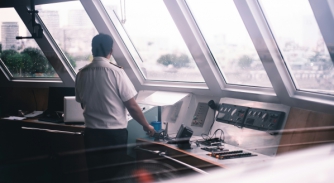
Who captains the captains?
What can senior crew learn from the leadership training acquired from a career in the British Royal Navy?
Crew
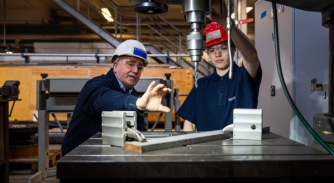
Building the next generation
Pendennis has been running an apprenticeship scheme for over 25 years, forming the bedrock of its experienced team of employees
Crew
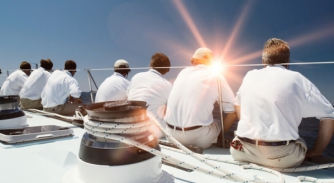
ISWAN begin new research project
Crew will take part in innovative on-board research using wearable and mobile technology to track the impact of social interaction on their well-being
Crew
.jpg)
The Superyacht Report - Captains Focus: Read It Now!
Issue 221: The Superyacht Report - Captains Focus is now available to read and download online
Crew
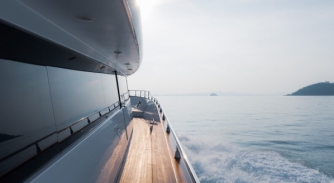
ISWAN publishes recruitment crisis action plan
In the face of rapid change across the industry, ISWAN has outlined specific initiatives to combat the recruitment and retention crisis
Crew
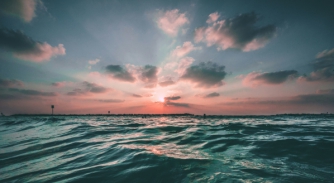
Crew harassment prevention
Benjamin Maltby discusses the requirement later this year for employers to take “reasonable steps” to prevent sexual harassment of their employees
Crew
Related news
Who captains the captains?
8 months ago
Building the next generation
9 months ago
ISWAN begin new research project
9 months ago
The Superyacht Report - Captains Focus: Read It Now!
9 months ago
ISWAN publishes recruitment crisis action plan
11 months ago
Crew harassment prevention
11 months ago
NEW: Sign up for
SuperyachtNewsweek!
Get the latest weekly news, in-depth reports, intelligence, and strategic insights, delivered directly from The Superyacht Group's editors and market analysts.
Stay at the forefront of the superyacht industry with SuperyachtNewsweek



